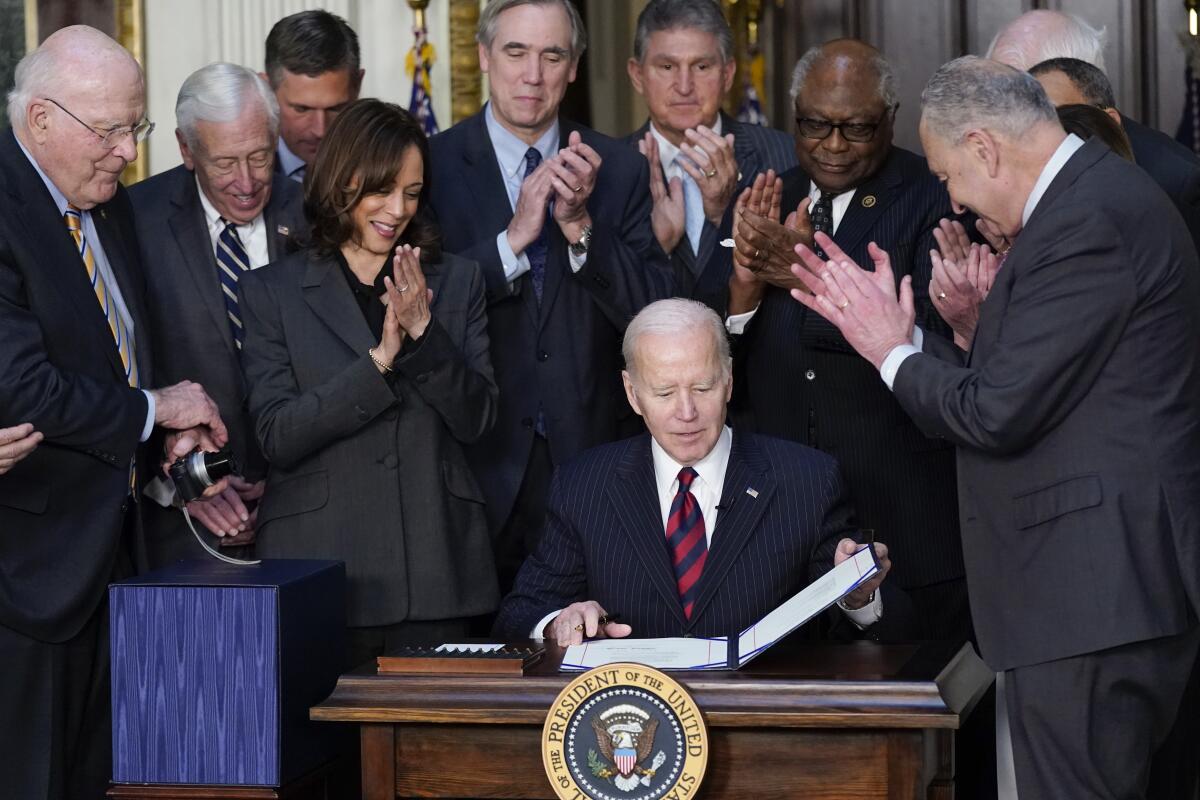Earmarks were banned for a decade. Their return means money for projects across California

- Share via
WASHINGTON — After a decadelong prohibition, congressional earmarks make their return this week, sending more than $760 million in transportation, military, healthcare and other projects to California.
President Biden signed into law a $1.5-trillion government spending bill on Tuesday that includes financing for initiatives specifically written by lawmakers seeking to boost their local universities, roadways or parks with federal dollars. Nearly 500 of the projects will be in California.
The biggest projects in the state’s $766-million pot involve military construction at naval bases in Coronado and Ventura County requested by Sen. Dianne Feinstein (D-Calif.). Other undertakings include $15 million to dredge Channel Islands Harbor in Oxnard, written by Rep. Julia Brownley (D-Westlake Village); $15 million to replenish beaches from Anaheim Bay to Newport Bay, pushed by Rep. Michelle Steel (R-Seal Beach); and $10 million to stabilize the Coaster commuter rail along the Del Mar Bluffs, led by Feinstein.
Other Southern California projects funded in the bill include $2 million to convert a Santa Monica parking structure into affordable housing for people experiencing homelessness, written by Rep. Ted Lieu (D-Torrance) and Sen. Alex Padilla (D-Calif.), and $1.5 million for Children’s Hospital Los Angeles to buy a high-performance heart MRI scanner.

Earmarks were banned on Capitol Hill 11 years ago at the behest of House Republicans and then-President Obama in response to scandals surrounding how lawmakers were using them. Democrats brought so-called pork barrel spending back last year with reforms that they say will prevent abuse. Some lawmakers, particularly conservatives, say earmarks can lead to wasteful spending.
Democrats, who renamed earmarks the more politically palatable “community project funding,” say lawmakers know what their districts need better than a Washington-based bureaucrat who would otherwise decide what receives funding. And lawmakers from both major parties like to promote the spending to their constituents.
Within moments of the spending bill’s passage in the House last week, many lawmakers were broadcasting the federal pork they were shipping back home. Republican Rep. Don Young of Alaska — a state with a long history of winning earmarks — boasted that he had “proudly secured” funding for a fire station and health center.
Rep. Salud Carbajal (D-Santa Barbara) similarly bragged about using earmarks “to deliver real results for Central Coast residents.”
In a sign of the political potency of such earmarks, many of the most vulnerable House Democrats secured sizable pots of money. Among California’s most endangered incumbent Democrats in this fall’s midterm election, Rep. Mike Levin of San Juan Capistrano landed $21 million for eight projects and Rep. Josh Harder of Turlock won more than $11 million for at least eight.
Sen. Joe Manchin III of West Virginia, the most conservative Senate Democrat and a swing vote on several Biden administration priorities, counted up a whopping $166 million in earmarks for his state.
Congressional leaders like earmarks because a lawmaker who has a project tucked into a larger bill is more likely to vote yes. Such spending be a potent form of political grease in the complex legislative process. But that’s not always the case.

Rep. Doug LaMalfa (R-Richvale) received millions in earmarks, including $4 million to expand broadband in Plumas and Sierra counties. He also got $1 million for a fire-suppression system in Nevada County. Yet he voted against the portion of the bill that contained that funding.
LaMalfa said he supported “many individual pieces” of the legislation, but criticized House leaders for giving lawmakers less than a day to read the 2,741-page measure. He was also worried about the overall price tag.
Rep. Jay Obernolte (R-Big Bear Lake) similarly secured millions in earmarks, including money to improve the streets in the cities of Highland and Hesperia, but voted against that portion of the legislation.
The bill “increases spending over previous years at a time when our national debt is already over $30 trillion, which is $90,000 per American ... without including any measures to reduce the national debt,” he said in an explanation of his opposition.
It wasn’t just Republicans who voted against portions of the bill containing their pork spending.
Rep. Barbara Lee (D-Oakland) pushed for $1.5 million for a seawall in the city of Alameda and $500,000 for the Youth Alive violence prevention program. But she voted against that part of the bill, which also covered defense spending.
Lee had advocated for the earmarks as a member of the committee that crafts spending bills. But as a longtime antiwar advocate, she has historically opposed defense spending bills. It was “unfortunate procedural circumstances” that led defense spending to be combined with earmarks that she supported, an aide said.
Not all lawmakers included earmarks in the bill.

Several Republicans did not request any earmarks. They included California Reps. Darrell Issa of Bonsall and Tom McClintock of Elk Grove and Minority Leader Kevin McCarthy of Bakersfield.
When Democrats brought back the practice last year, they implemented new rules to reduce the chances of requests being used in corrupt ways.
Lawmakers keenly remember the scandal involving former Rep. Randy “Duke” Cunningham (R-Rancho Santa Fe), who resigned after pleading guilty in 2005 to receiving $2.4 million in bribes from defense contractors in exchange for including earmarks in legislation. And former House Appropriations Committee Chairman John P. Murtha (D-Pa.) was under investigation for using his post to steer earmarks to his brother’s lobbying firm, the Washington Post reported after the lawmaker died in 2010.
Under the new rules, lawmakers must publicly disclose their requests and certify that they and their families do not have any financial interest in them; and for-profit entities can no longer receive funding from earmarks.
Only one House Democrat, Rep. Katie Porter of Irvine, did not seek to include earmarks in the bill, saying they invite corruption and wasteful backroom deals.
“Pork-barrel spending should remain banned,” Porter wrote in a Wall Street Journal opinion piece last year.
More to Read
Get the L.A. Times Politics newsletter
Deeply reported insights into legislation, politics and policy from Sacramento, Washington and beyond. In your inbox three times per week.
You may occasionally receive promotional content from the Los Angeles Times.











